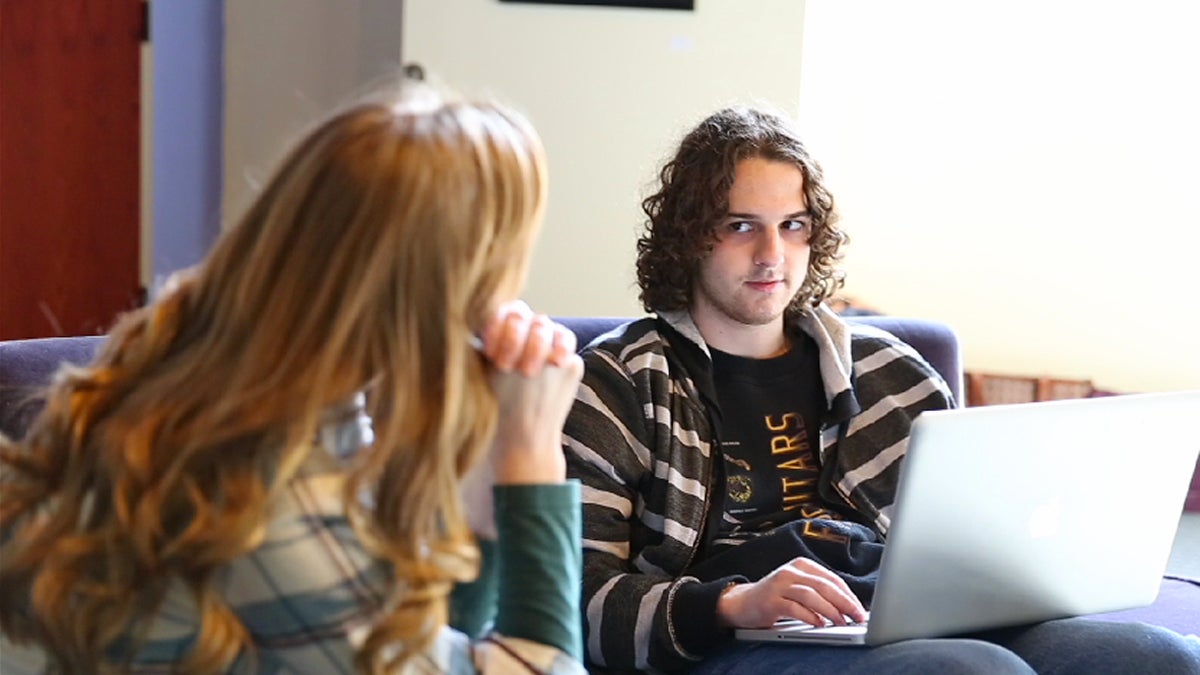Embracing and challenging the true storytellers in adults with autism
Listen
Jason Halberstadt (right) works with actor and teaching artist Clare O'Malley in a playwriting class for adults with autism at Theatre Horizon in Norristown
We visit a writing workshop in Norristown, Pa., that guides adults with autism through the playwriting process.
The lobby of Theatre Horizon in Norristown is cacophonous during a weekly playwriting workshop. The sounds do not always seem to be productive.
Somebody may be singing to herself. A man may be squawking in a high falsetto. Another person may be busily repeating a series of words. Conversation can be fast, loud and insistent.
“Some of the vocalizations are not typical to my ears or yours,” said Tasha Milkman, a teacher with Philadelphia Young Playwrights. “But it’s amazing when you think someone is not in tune to what the conversation is in the group, and then all of a sudden you realize they absolutely are. But they’re expressing it in a different way.”
This is a writing workshop for adults with autism. Actors with Theatre Horizon and teachers with Philadelphia Young Playwrights are working together with seven students to write short, one-act plays.
It can be harder than it seems. Most of the students in this class have vast, sprawling stories in their head, with an array of characters, circumstances and plot twists. It gets complicated.
“I’ve written characters in this universe, which is a long fiction I’ve been working on,” said Lena Kalner, 20, who has both autism and dyslexia. Her one-act play, about a fictional entertainment news show called “Reel Time with Darby Green,” comes out of her television watching habit.
“I watch quite a bit of TV. This came from ‘Always Sunny [In Philadelphia]’ and ‘West Wing,’ said Kalner. “I like ‘Orange is the New Black,’ ‘Buffy the Vampire Slayer,’ ‘Parks and Rec,’ ’30 Rock.’ There’s a lot.”
“Reel Time with Darby Green” is a parody concept — really a transcript of a TV show wherein the hapless Green believes he is interviewing Danny Devito, but is really sitting across from Robert Deniro. The show has commericals of products Kalner has made up, and feature stories about TV shows she has invented.
“I created a fake fan following for a fake TV show in the [Darby Green] story, complete with fake actors playing fake characters,” said Kalner. “I wanted to include that, but I didn’t have time to explain it. It’s ‘Homeland’ meets ‘Game of Thrones’ — a story about how they use psychics to combat terrorism.”
It’s complicated.
Several of the playwrights are returning students, slowly piecing together their opus one scene at a time.
“So many students are inundated with TV,” said Milkman. “This session is focused on one-act plays. We challenged the students to only have two or three characters. The concept of writing with a few characters is intimate, is challenging.”
For the last seven years, Theatre Horizon and Philadelphia Young Playwrights have been teaching children with autism. Horizon co-founder and artistic director, Erin Reilly, was inspired by a meeting with a boy who had autism.
“We really feel that we are storytellers. The world needs to hear from the full range of people on this planet,” said Reilly, who last year expanded the program to include adults with autism.
Children and teenagers with autism have a range of social and educational programs and services available to them, but at age 18 they are cut off from many of them. Theatre Horizon’s program is one of the few for adults with autism.
“It is so rewarding to work with students with autism because their take on the world is so innovative, and incredibly personal and unique to them,” said Reilly. “I learn something new everytime I’m in this class with these students.”
The plays written by students with autism are performed once, by professional actors, at the end of the workshop.
WHYY is your source for fact-based, in-depth journalism and information. As a nonprofit organization, we rely on financial support from readers like you. Please give today.




